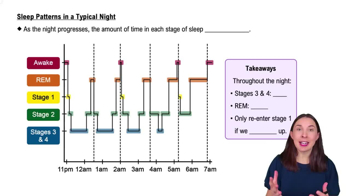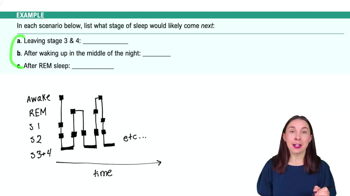Table of contents
- 1. Introduction to Psychology1h 43m
- 2. Psychology Research2h 20m
- 3. Biological Psychology2h 41m
- 4. Sensation and Perception28m
- 5. Consciousness and Sleep32m
- 6. Learning41m
- 7. Memory34m
- 8. Cognition37m
- 9. Emotion and Motivation35m
- 10. Developmental Psychology33m
- 11. Personality48m
- 12. Social Psychology41m
- 13. Stress and Health41m
- 14. Psychological Disorders44m
- 15. Treatment47m
5. Consciousness and Sleep
Sleep
Struggling with Psychology?
Join thousands of students who trust us to help them ace their exams!Watch the first videoMultiple Choice
For which of the following would hypnosis probably be most effective?
A
Changing eating habits
B
Helping people to stop smoking
C
Curing alcoholism
D
Controlling pain
 Verified step by step guidance
Verified step by step guidance1
Understand the nature of hypnosis: Hypnosis is a trance-like state of focused attention and increased suggestibility, often used in therapeutic settings.
Consider the effectiveness of hypnosis: Hypnosis is most effective for conditions that involve psychological and physiological components, such as pain management.
Evaluate the options: Changing eating habits, stopping smoking, and curing alcoholism involve complex behavioral and psychological factors that may not respond as well to hypnosis alone.
Focus on pain control: Hypnosis has been shown to be effective in controlling pain by altering the perception of pain and reducing anxiety associated with it.
Conclude that hypnosis is most effective for controlling pain due to its ability to influence perception and suggestibility, which are crucial in pain management.

 3:25m
3:25mWatch next
Master Circadian Rhythms with a bite sized video explanation from Hannah Gordils
Start learningRelated Videos
Related Practice


































































































![Race, Genes and IQ Differences | Bret Weinstein [Mini Clip]](https://img.youtube.com/vi/IztL_m3pd70/mqdefault.jpg)



































































































